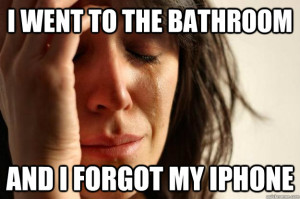In today’s age, we are a generation of social media addicts. Facebook, Instagram, Twitter, Tumblr, you name it. When we’re not scrolling through these apps or websites, we literally get withdrawal from them. Ever wonder about the scientific reasoning behind our social media obsessions? Well, you’re about to find out.
If  you’ve ever felt the desperate urge to check that new e-mail, Twitter reply or refresh your Instagram feed, it’s because of the dopamine in your brain. In a blog I found, it says that dopamine is a chemical produced in various parts of your brain and controls moods, your motivation and sense of reward. Dopamine means that the anticipation is greater than the reward: the urge to check that text is greater than the satisfaction we feel once we’ve read it and we can sometimes experience a little low when the text wasn’t what we expected.
you’ve ever felt the desperate urge to check that new e-mail, Twitter reply or refresh your Instagram feed, it’s because of the dopamine in your brain. In a blog I found, it says that dopamine is a chemical produced in various parts of your brain and controls moods, your motivation and sense of reward. Dopamine means that the anticipation is greater than the reward: the urge to check that text is greater than the satisfaction we feel once we’ve read it and we can sometimes experience a little low when the text wasn’t what we expected.
Part of what makes the internet and its messages so attractive to your dopamine systems is that it’s unpredictable. Dopamine is stimulated by uncertainty; not knowing everything. So, when we get an alert on our phone, we’re unsure. It could be anything, a text, e-mail, a reply on Twitter or a Facebook message, we don’t know until we check it out nor do we know who’s it from or what it’s about. Dopamine loves that.
According to a new study from UCLA, when we need a mental break, that’s our brains craving social interaction. “The social nature of our brains is biologically based,” said lead researcher Matthew Lieberman, Ph.D., a UCLA professor of psychology and of psychiatry and biobehavioral sciences. “When I want to take a break from work, the brain network that comes on is the same network we use when we’re looking through our Facebook timeline and seeing what our friends are up to.”
The researchers showed study participants photos of people, similar to the kind you see on social media. Each picture was captioned with either a physical description of the person or a statement about how the person was feeling. People looking at the emotion-captioned pictures experienced major activity in their prefrontal cortex, revealing a social connection just from gazing at a photo. They found the same pattern of brain behavior when people took a mental break, leading them to conclude that we’re wired to seek out other people whenever we’re not working.
Blame that Facebook stalking on your dorsomedial prefrontal cortex, the brain structure responsible for making us see the world through a social lens. When this part of your brain is activated, you’re more perceptive of other people and can make faster judgments about what emotions they may be feeling—about 10 percent faster, to be exact.
In addition, a recent study by Harvard University shows evidence as to why social media platforms are so popular and highly addictive for many people. Through a series of experiments, the researchers learned that the act of disclosing information about oneself activates the same part of the brain that is associated with the sensation of pleasure, the same pleasure that we get from eating food, getting money or having even having sex.
The study made it clear that our brain considers self-disclosure to be a rewarding experience nonetheless. In the experiments, the Harvard researchers asked test subjects a series of questions about their and others’ opinions while hooked up to an MRI machine. The researchers found that the regions of the brain associated with reward were strongly engaged when people were talking about themselves, and less engaged when they were talking about someone else. Not only do we use social media to stay connected with others, but we also use it as a way to boost our self-esteem.
Even though social media use is usually harmless, it’s important to not become too dependent on it and have an extreme addiction. Just like how we discussed in class the correlation between texting and test grades, too much social media activity can impact academics, relationships, and other parts of one’s life.
We should all be aware of why we are so drawn to social media but we should all be equally aware of how much time we spend using it!! Try to have as much willpower as you can and don’t neglect all your responsibilities for your iPhone!
